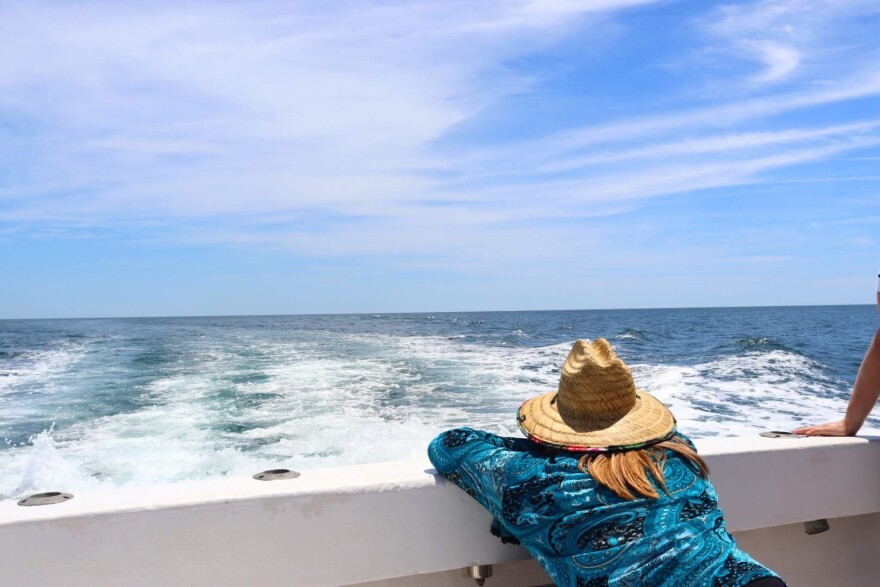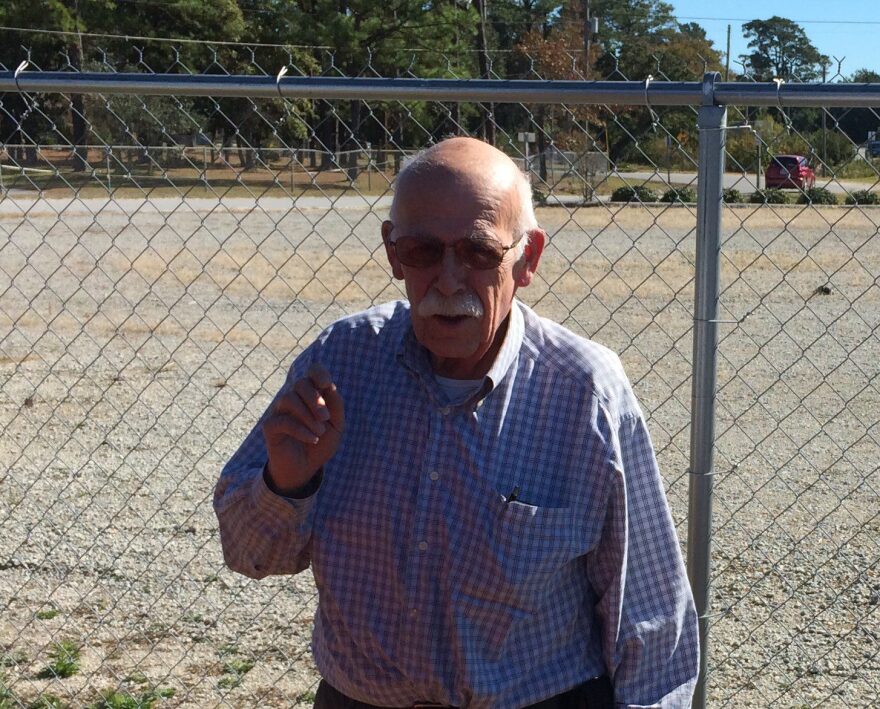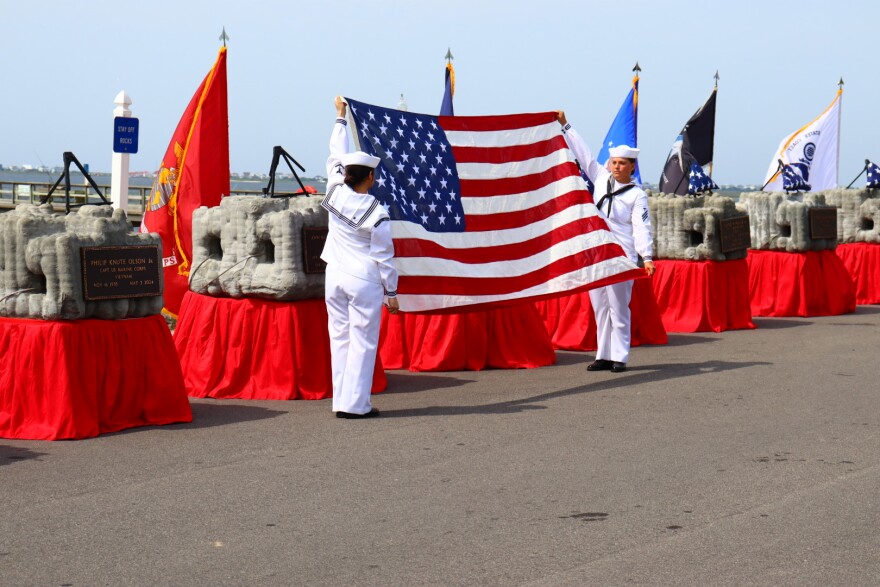A nonprofit serving veterans has partnered with a company that specializes in nature-based resiliency technology to give fallen service members a burial at sea that also supports the ecosystem. Public Radio East’s Annette Weston spoke with the founder of the veteran-focused organization and with the eco-scientist behind innovation for this edition of Weird Science.
Veterans Memorial Reef is a non-profit organization that honors fallen heroes by placing them in an aquatic memorial so they may be laid to rest at sea off the coast of North Carolina. It was founded by Thomas Marcinowski, who served 24 years as a medic in the Air Force and the Army.
“As a veteran, I always wanted to be cremated and put out to sea, be one with nature,” he said, “As I grew older and I worked for Veteran Affairs, talking to a lot of veterans, a lot of them had the same initiative. They wanted to be cremated.”
Thanks to an article in National Geographic several years ago, Marcinowski learned of a project in Florida that allows for the ashes of veterans to be scattered underwater, with an inscribed rock marking the spot and he wondered, ““How can we make this where it's something larger than just the little rock with the name on it? So, as I thought about it, came up with this design of Veterans Memorial Reef where we actually take the cremains, we put them in an aquatic urn. They are placed into a large ecofriendly memorial marker, what we call a memorial marker. It is sealed. The family on day one gets to make a time capsule of that loved one.”

While developing the initial plan for the memorial, Marcinowski attended a conference in Wilmington. There he ran into Dr. Matthew Campbell, co-founder of a company called Natrx, which specializes in creating 3-D printed artificial reefs.
Campbell said, “And after my talk, Thomas came up to me and said, ‘Hey, we're wanting to build reefs, too.’ And he told me about his vision with Veterans Memorial reefs, and I was struck by, one, what he was doing and the honor he was giving it. And that's how we met.”
The two men worked together to make the vision a reality, combining the existing design elements of the Natrx reefs with a lasting memorial to the fallen. “You can specifically design it and so that's what I worked with Thomas on is, ‘OK, these reefs have to look a certain way.’ They have to function a certain way as far as creating homes for the fish and other marine life, but then they're hosting these vessels of the remains of these soldiers, so, it has to function a certain way as well,” Campbell said. “From that perspective, how do you how do you move it? It how do you deploy it?”
Campbell said he takes pride in the project and his work with Marcinowski and, “Really, the honor and respect that he was bringing to that, I'm very proud to be part of it.”

So far, 30 veterans have been honored with a full military service before their burial at sea in southeastern North Carolina. Marcinowski said, “We do a full ceremony as if you were at Arlington Cemetery. We have all of the veterans lined in a ceremonial fashion, we play Taps, we have the Honor guard representing the respective service. They do the flag presentation, fold, and then hand to the family representing that veteran and their service to the country.”
A complete list of veterans placed in the memorial can be seen HERE.
The family members of the veterans being honored personalize the marker before it’s lowered into the water. “They take mementos, little things that recognize or meant something to that veteran and they put it on the marker. It's, like I said, a time capsule and they have many different variations,” Marcinowski said, “What they do, some people put their rank, others put what they call Challenge Coins in the military. Some will put fishing lures. We've had people put the grandchildren's hand prints onto it.”
Those that have been buried in the North Carolina coastal waters include U.S. Navy Veteran Joseph McDonald – Marcinowski said he was contacted by friends of the late sailor because he had no living family members. And Felix, a service canine in the U.S. Coast Guard.

In addition to honoring the last wishes of dozens who have served our country, Marcinowski said the project is also revitalizing an old project on the sea bed – an artificial reef installed off the coast of Wilmington in the mid-80s.
“It is a R372 on the nautical maps,” he explained, “However, all the locals, we've called it Five Mile Box Cars. Back in the day when they were creating artificial reefs, they took old box cars from the rails and dumped them over the side and that was the reef they were creating. Over the years those have rusted away, so we're utilizing that space. It's approximately 162 acres. In an agreement with the state of North Carolina Department of Fisheries, and we placed the veterans out there.”

As with any other burial spot, there have been some that visited the reef to pay their respects. “We've had several people go out there and dive it,” Marcinowski said. “The first people that actually dove it for us was the Marine Special Operations out of Camp Lejeune. They had a special permit from the base commandant, where they went down and they did a survey of the reef site for us and they re-positioned some of those markers.”
Narq’d Diving Club in Wilmington has helped the organization with the burials, and Marcinowski said his organization will soon partner with the veteran-led company to teach diving safety to the families so they can visit their loved ones’ resting place.
They are also working with universities to monitor the impact of the artificial reef. Marcinowski said, “We're trying to work with institutes of higher learning, one being UNCW, UNC of Wilmington, where they go out and hopefully do studies on how this is impacting our coastline. How is it helping North Carolina's coast due to hurricanes shifting of the sands and how does it impact with all the additional growth and/or fish?”

The cost of the burial at sea is about $4,500, but Marcinowski noted that because his organization is a non-profit, that expense is tax-deductible.
Living veterans who wish to have their cremains lowered to the seafloor in the artificial reef after their death can get in touch with the organization to make arrangements to do so – much like any pre-planned funeral.
Meanwhile, Campbell said Natrx is involved in many other projects in North Carolina intended to make oceanside communities more resilient.
“We're creating what they call living shorelines,” Campbell explained, “So, you create the base structure and then the oysters and other organisms grow on it, and it creates a fully functioning wave attenuation device or erosion protection for the shoreline to keep the shoreline stable. But then we're also just creating oyster reef for oyster reefs purposes, because they're good to have in our bays. They clean up the bays, they provide food and habitat for other fish and crabs and such. And then we're creating reefs for fish as well.”
VMR and Natrx will continue growing the program, planting more reefs and honoring as many veterans and their families as possible.


